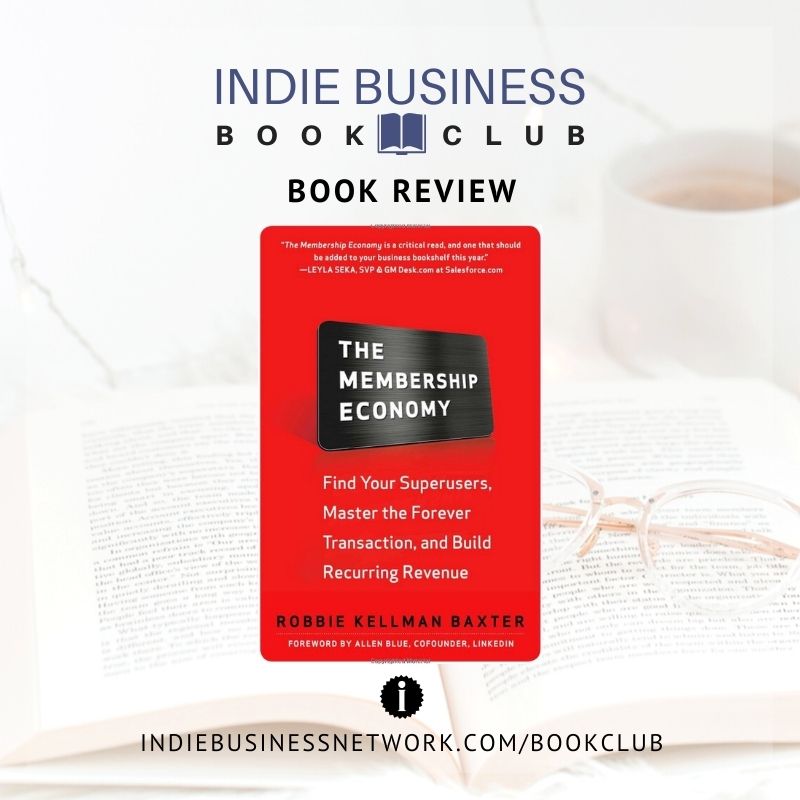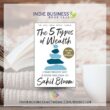For the September 2020 edition of the Indie Business Book Club, we read The Membership Economy by Robbie Kellman Baxter. According to the dust jacket, the book is designed to “show you how to turn ordinary customers into members for life.”
If you're not familiar with the Indie Business Book Club, you can click here for more information.

Summary
From the dust jacket:
Whether you're a small business with limited resources, an established company using a traditional business model, or a hungry start-up who wants a bigger bang for your buck, this comprehensive guide provides a wealth of membership building options to suit every need.
Some of the things the book says it will teach you how to do:
• build an online community your customers will love
• create a self-generating revenue stream
• keep membership and profits growing for years to come
Highlights from The Membership Economy
Here are few highlights to help you decide whether this book might be for you.
Highlight No. 1: A subscription is not necessarily a membership.
Baxter reminds us that subscriptions are related to memberships, and that you cannot have a profitable membership without an underlying subscription. However, you can easily have a subscription without a membership. For example, I currently make an automated monthly subscription payment to a company that sends me a skincare trio every month. I don't have to worry about running out of the products, and that's nice, but I'm not treated like anything more than a monthly transaction. I only hear from the company if my credit card fails, they send an automated “thank you” or “review the product” message, and so forth.
They could easily influence me to buy more products simply by tweaking how they interact with me to treat me like a member instead of like a monthly payment. The way things are now, all that's keeping them from losing my business is the next skincare company that offers similar products on subscription, and which treats me like more than a monthly receivable.
Highlight No. 2: Memberships are about relationships.
The case studies mentioned in the book are reminders that memberships are not about quick or short-term sales. Instead, memberships are accretive, meaning they gradually increase in value over the years based on the company's investment in the everyday lives of its members. This approach produces new opportunities to add value on a consistent basis, and thus, new and organic (this is important) opportunities to boost sales every single day.
Highlight No. 3: Lots of case studies.
There is good news and there is bad news here.
The good news is that Baxter has access to a lot of huge companies, each of which runs subscription and/or membership programs that are far more involved than what any small business could manage. Seeing how these companies take advantage of the membership business model is inspiring and enlightening.
The bad news is that almost all of the examples in the book are of massive companies, and it's a real challenge to translate their experiences into what you or I experience on a regular basis. While the mindset may be the same, the tactics that work for companies like Hulu, Pandora, and American Express do not work for small business owners with limited resources.
There is a bit of a refuge in Chapter 15 where Baxter features what she calls “mom and pop,” which, by the way, is a term that makes me cringe. For example, she mentions an Indie book store which saved itself from being obliterated by online book sellers by selling its events program to a non-profit funded by a membership community of literary enthusiasts. The founder no longer owns the business, so this example is not the best for small businesses from a tactical perspective.
Chapter 15 also highlights examples like Alan Weiss, the “Million Dollar Consultant,” Dave Ramsey and Michael Hyatt. These are multi-million dollar companies built on personal brands, which are anything but “mom and pop.” Its unfortunate that the book lacks subscription and membership examples from the types of small businesses that most small business owners can actually relate to.
Even with that flaw, no matter the size or your business, you will learn a lot about the mindset you must embrace if you want to leverage the membership business model.
Who should read The Membership Economy?
If you embrace the notion that a strong brand community builds a strong and long-lasting business, then you will enjoy reading this book and putting the membership mindset to work in your business. The Membership Economy will give you fresh ideas for how you can treat the people who buy your products like more than just a cha-ching. It's fun to see how basic relationship components can help you build out a business and create solid opportunities for predictable sales all year long.
Buy The Membership Economy
Buy this and other Indie Business Book Club picks at IBN's Amazon shop.
Feedback and Share
Did you read along with us? What do you think of this book? Does your business offer subscriptions or memberships? What do you think about the idea that any business, no matter how small and no matter what it sells, can successfully leverage a membership business model? Please share your comments and feedback below.
Want more?
If you'd like to have conversations like this with like-minded success oriented Makers all the time, then join me in the Maker Mastermind community on Facebook.
Subscribe
If you liked the information in this article, there's more where this came from! Subscribe to my weekly newsletter at this link.



